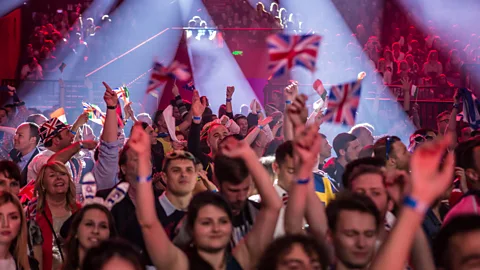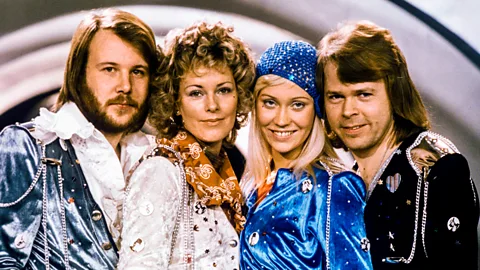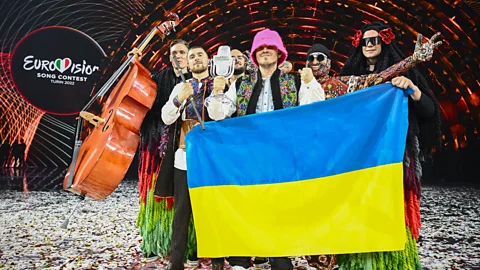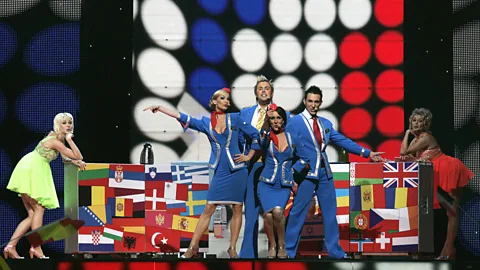Eurovision: Why some countries vote for each other
 Getty Images
Getty ImagesEurovision was created to bring Europe together, but its voting history shows affinity and rivalry might be more important than melody.
Since 1956, the Eurovision Song Contest has been an international arbiter of musical talent – launching stars from Celine Dion (1988, Switzerland) to Abba (1974, Sweden), Netta (2018, Israel) to Maneskin (2021, Italy).
Despite the winners' clear skill, however, the competition's process, in which each participating nation puts forward one song entry and votes for other entries, has made the contest vulnerable to criticisms of bias. Countries can't vote for themselves. But they can vote for the songs put forward by nations they consider "friends", whether because of geographical proximity or cultural, political or historical similarities.
Eurovision organisers have always argued that the competition is apolitical. And they have taken steps to try to minimise perceived bias in the past – structuring the contest so that only a certain number of neighbouring countries can compete in the same semi-final, and therefore have a vote on the same night, for example.
But how successful has this been? How much of a role has bias played in past voting decisions? Will the recent rule change – to have the public, rather than judges, vote in the semi-finals – make it better, or worse?
And, most of all, is it really possible to say Eurovision is, or has ever been, truly apart from politics?
You might also like:
"Music speaks across borders and languages – so it is inherently political," says Helen Julia Minors, head of the School of Arts at York St John University, UK and author of a recent article on Eurovision's voting changes.
She points out that Eurovision's original mission, to bring European countries together after being torn apart by war, is political, too. "For a contest to be established to bring together countries and people to share culture and to celebrate culture, political content will always be there," she says. "Although the acts cannot be political, in terms of speaking to a specific political opinion or party, the songs can be representative of current political, cultural issues."
 Getty Images
Getty ImagesExamples abound of song entries doubling as political messages. In 1975, for example, the first year Turkey participated, Greece withdrew in protest. The next year, Greece chose to enter the song Panaghia Mou (My Homeland), written about the Turkish invasion of Cyprus.
Eurovision doesn't just display the politics that take place between countries, either: the process of deciding which song to put forth is domestically political for each country, too. One example is in Switzerland, which, each year, must decide which of its linguistic and cultural traditions – German, Italian or French – to privilege with its entry.
"Eurovision is legendary as an arena for settling diplomatic scores, venting ethnic grievance, baiting national rivals and undermining governments," one British newspaper columnist wrote in 2005. (Far from a stain on the competition, it is such political subtexts that, he sniffed, "make Eurovision worth enduring".
Even the question of which countries participate – and which are allowed to participate – has shown just how unrealistic it is for the contest to claim to be above politics. Most recently, in 2021, Russia was banned from the competition after its invasion of Ukraine. It was Ukraine, of course, that ultimately won the contest that year.
But what about the vote itself? Are certain countries, or "blocs" of countries, more likely to vote for – and against – each other than others?
It's long been suspected, and some research now bears these suspicions out. One study, for example, analysed the voting history of participating nations to see whether certain countries, or pairs of countries, exhibited preferences. They did. "Collusive pairs" – countries that tended to vote for each other far more often than would happen by random chance – included Greece and Cyprus, France and Germany, the United Kingdom and Ireland, Sweden and Finland – and, prior to 2016, Ukraine and Russia.
"With 60 years of data, the results support the hypothesis of regional collusion and biases arising from proximity, culture and other irrelevant factors in regards to the music … which alone is intended to affect the judgment of the contest," the authors, from the University of Central Florida, wrote.
 Getty Images
Getty ImagesSimilarly, another, 2020 paper found "strong and recurring patterns of mutual point exchange between neighbouring countries". Nations that perform the best, the researchers found, tend to be those with the most bonds – whether linguistic, ethnic, historical or geographic – to other nations. And while this has been true throughout Eurovision's history, countries have been growing their networks (and reaping the benefits of the resulting bias) more in recent years. Another paper published in 2018 had similar findings.
For the 2023 contest, a rule change means only the public, rather than expert judges, will vote in the semi-finals, another recent change to procdure. The question is – will this make such bias more apparent, or less? The judges, after all, are selected to provide objective assessments of a song's quality.
Still, says Minors, it's important to recognise that this is a global vote, meaning that audience members can have a say who aren't from one of the participating countries.
"The organisers, in making the decision to change the voting system, are trying to ensure all audience members, wherever they are from, can feel and can be involved. It is more inclusive," she says. "But it means that the criteria for the contest is less of a guiding principle." In some respects, that could mean more politicisation; if most of the audience is Anglophone, for example, they may be more likely to vote for English songs.
On the other hand, she says, it means that – in the semi-finals, at least – the public vote means there is less risk of countries "colluding" in voting. "The new voting structure is likely to reduce the risk of any political bias and rather shift to a popularity vote," she says.
 Getty Images
Getty ImagesStill, says Minors, questions of politics and national identity are embedded within Eurovision no matter what – and that's not necessarily a bad thing.
"The debates around these issues are part of the entertainment, cultural experience, and intellectual engagement and joy of the whole thing," she says. And, she points out, it doesn't just highlight differences between nations. "It can bring people together and encourages a sharing of music, lyrics, poetry, stage design, lighting design and cultural heritage," she says, pointing to the 360-degree visual postcards in the semi-finals that showed the similarities between the UK, Ukraine and the country performing.
In other words, even with all of its inherent biases, Eurovision really can unite people… just as its organisers originally promised.
--
